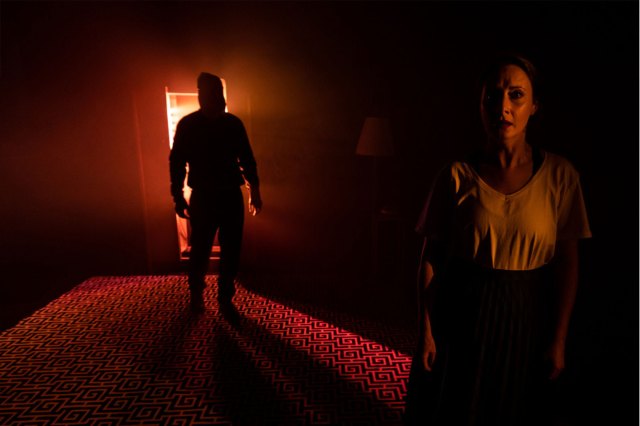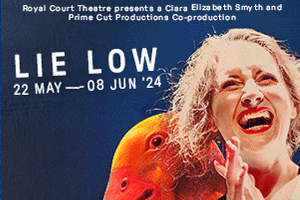Lie Low at the Royal Court – review
Ciara Elizabeth Smyth’s new play runs until 8 June in the Jerwood Upstairs space

Fresh from award-winning runs at the Dublin and Edinburgh Fringe Festivals, Ciara Elizabeth Smyth’s Lie Low is a startling and brilliant new play that really pulls us into the mud of assault, consent and memory. The play comes together around the story of what happens when Faye ropes her brother Naoise in to assist with some DIY exposure therapy to help her with a bout of insomnia, a year after her flat was broken into and she was assaulted.
It’s not quite as simple as a conversation in a room – although Smyth’s dialogue is fantastic, with scenes able to pivot completely between tragedy and comedy in moments, with expert performances from Charlotte McCurry and Thomas Finnegan. We also move in and out of what might be Faye’s mind, with a series of bizarre, hilarious, horrific danced refrains featuring one or other of the characters wearing a giant duck mask, as well as scenes when she talks to a doctor, presented only through voice. Through these scenes, the world of the play (and of the space of the Jerwood Upstairs itself) seems to shift, becoming as vast and as tiny as the confines of Faye’s flat where she remains, sequestered off from society.

Within her flat, in these scenes between Faye and Naoise, Smyth is uninterested in easy, didactic answers to questions about abuse and consent. Without spoiling the finer parts of the plot, the play is constantly twisting, showing up the ease by which we might categorise people into being either abusers or victims. Smyth’s exploration of gender in these contexts is particularly insightful. She shows us the ways that identifying too much as a victim – and particularly as a female victim – can become problematic if it removes accountability; alongside this, she shows that there isn’t a simple boundary between ‘good’ and ‘bad’ men, and that trying to deal with abuse without recognising this spectrum cannot succeed.
McCurry and Finnegan excel at laying out these positions and make the weird and difficult conversations and scenarios the siblings work through feel entirely believable. It’s impossible to find answers to any of these issues in no small part because both of them are so convincing and true, whatever position they might be in.
Director Oisín Kearney’s production meets the complexities here incredibly well. He expertly moves us through the different moods and settings, both real and felt, smoothly or with jolts and glitches where needed. As referenced above, the very space of the theatre seems to change as the play continues, which Ciarán Bagnall’s set and lighting and Denis Clohessy’s sound are particularly useful for, sculpting the area and helping to move us between the ridiculously and the tangibly nightmarish. It’s perfectly theatrical and impeccably put together, which is what really allows for the serious and impossible questions at the heart of the play to be properly examined.
Although not an entirely easy watch, Lie Low is well worth seeing for anyone interested in a nuanced take on how we might deal with the fallout of abuse and assault within society. With excellent comic execution, it also offers an accessible approach to the issues.

















